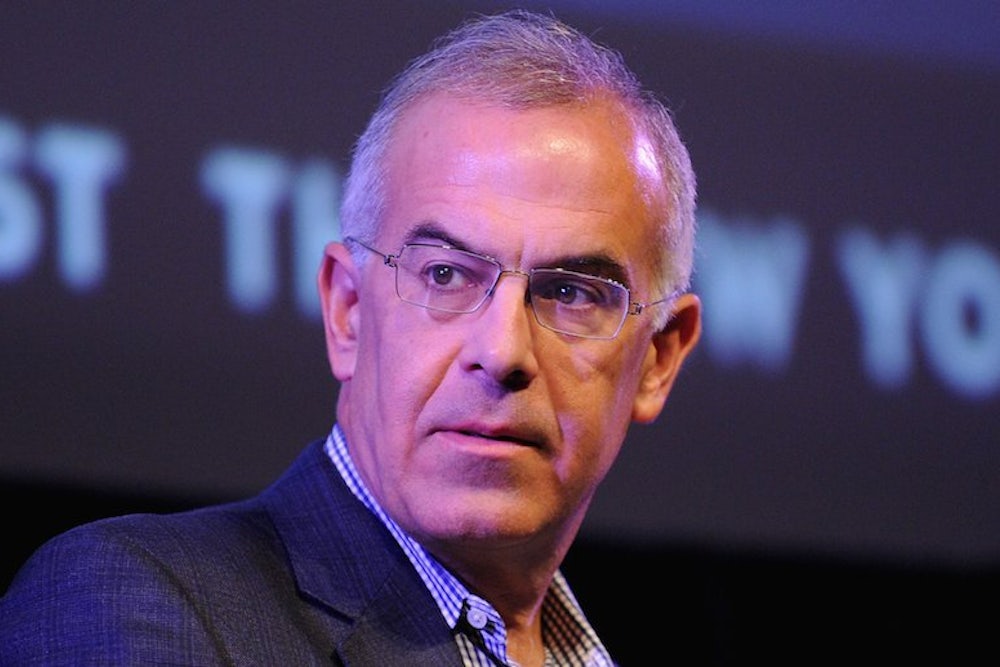In his Tuesday column, "The Cost of Relativism," The New York Times’ David Brooks cites a new book of research on "the growing chasm between those who live in college-educated America and those who live in high-school-educated America," and highlights several "horrific" profiles from the latter group. Brooks uses their stories—which feature drugs, violent crime, unintended pregnancies—to argue for the reintroduction of social norms, which "were destroyed by a plague of nonjudgmentalism." While "intense sympathy" for the disadvantaged is in order, he writes, “It’s not only money and better policy that are missing in these circles; it’s norms.” Reintroducing norms to these poor souls "will require holding people responsible. People born into the most chaotic situations can still be asked the same questions: Are you living for short-term pleasure or long-term good?"
Who, exactly, is asking these questions and holding people responsible? Much as Brooks insists that "norms need repair up and down the scale, universally, together and all at once," it's worth noting that he fails to cite a "horrific" profile of a college-educated American. By implication, it's the norms of upper-class America that Brooks would impose upon the lower class, in order to repair their supposed behavioral pathologies.
Brooks' underlying assumption is wrong: The baseline moral values of poor people do not, in fact, differ that much from those of the rich. Poor people feel ashamed of the incarceration of relatives. The poor, too, want to get married at roughly the same rates as the rich, though the rich have an easier time pulling it off. Matrimonial aspirations, then, are decaying no faster among the poor than the well-off; it’s only the ability to maintain a marriage under the stressors of poverty that seems to put poor families on unsteady ground. Lastly, lest anyone suspect the welfare-queen narrative about poor people eschewing hard work and responsibility holds true, Stephen Pimpare observes in his book A People’s History of Poverty in America that the stigma and shame of poverty and welfare are alive and well, meaning that welfare recipients tend to internalize society’s narratives about work and accountability. Poor people, whatever their material circumstances might compel them to do, don’t seem to lack a moral compass.
Now, if Brooks images that improving social norms is just a sliver of the solution, then he’s right: making poor families better off won’t erase all behavioral differences between the wealthiest and poorest. But it would go a long way. Despite all paranoia about poor people nursing addictions and indulging themselves before spending money on necessities, programs that distribute cash to the poor have been repeatedly proven as wise investments. People who use the Supplemental Nutrition Assistance Program (SNAP), or “food stamps,” tend to make healthier food choices than those who don't use SNAP; they also tend to purchase fresh fruits and vegetables when provisions (such as small credits for buying fresh fruits and veggies) are made that account for the extra cost of cooking multi-item meals. And, as a 2005 British study found, low-income parents who are given benefits to help raise young children "increased spending on items such as children’s clothing, books, and toys, and decreased spending on alcohol and tobacco.” In other words, reducing poverty through infusions of cash appears to correct many of the behaviors poor people are regularly maligned for, including neglectful parenting and unhealthy lifestyles, bringing them more in line with the habits of the well-to-do.
Morality should teach us how to live a good life. But to impose the easy virtue of the well-to-do on the poor is to request the most stressed and vulnerable members of society to display impossible moral heroism. To abstain from relationships, sex, and childbirth until financially secure enough to raise a child without assistance would mean, for many, a life of celibacy; to pour limited resources into education in order to score a respectable job would mean failing to make rent. If the problems plaguing poor communities persist after poverty is drastically reduced, that would seem an appropriate time to pursue the matter of a better "moral vocabulary," as Brooks calls it—and even then, the participation of low-income communities would be essential. But before that conversation can happen, the obvious solution to the “chaos” Brooks observes among poor communities is to reduce poverty, and let its moral quandaries resolve on their own.
